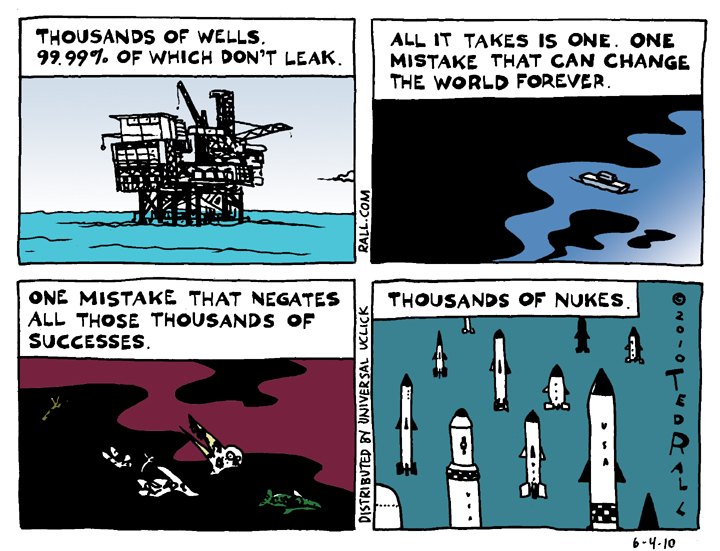A writer to TIME magazine pointed out (accurately) that there are thousands of oil wells that operate at sea without an accident. It’s a distinction without a difference—one that merely proves why offshore drilling is too big a risk.
The Environment is a Pass-Fail Class

Ted Rall
Ted Rall is a syndicated political cartoonist for Andrews McMeel Syndication and WhoWhatWhy.org and Counterpoint. He is a contributor to Centerclip and co-host of "The TMI Show" talk show. He is a graphic novelist and author of many books of art and prose, and an occasional war correspondent. He is, recently, the author of the graphic novel "2024: Revisited."

11 Comments. Leave new
Almost all of Brazil’s oil comes from offshore drilling, we’ve been doing this for more than 30 years with no disaster so far.
The difference is that Brazil has a stated owned oil company, Petrobrás, and a heavily regulated oil industry. The kind of cost cutting that BP did can’t be done here because of the Oil Unions and Congress.
Obama should just commandeer BP and make sure the other companies get the message.
Bingo, Ted! We always have to look at the worst case scenario, not with a mind of living our lives in fear, but in order to assess whether something is worth doing (or not doing). I could dash across a busy freeway a thousand times and not get hit; doesn’t make it safe, or smart, to do, though.
Yea right, Barry who isn’t qualified to manage the slurpee counter at a 7-11 is going to run an oil company.
I guess if we don’t have 100 percent assurances, we shouldn’t do something.
Have fun in Afghanistan, Ted.
Almost all of Brazil’s oil comes from offshore drilling, we’ve been doing this for more than 30 years with no disaster so far.
July 2000: More than a million gallons (4m litres) of crude oil have leaked from a refinery owned by state-run oil company Petrobras into a river near the southern city of Curitibia.
Brazilian oil spills
1974-Biggest spill 1.6m gallons in Guanabara Bay
Jan’ 2000-0.3m gallons in Guanabara Bay
July 2000- 1m gallons in the Iguacu river
Hey Jew Haters, you have a new member in your klan:
WH press corps’ Helen Thomas tells Jews to leave Israel and ‘go home to Poland and Germany’
Read more at the Washington Examiner: http://www.washingtonexaminer.com/opinion/blogs/beltway-confidential/wh-press-corps-helen-thomas-tells-jews-to-leave-israel-and-go-home-to-poland-and-germany-95628684.html#ixzz0pww9EASA
True, Afghanistan is risky. No one knows that better than I do. But I’m risking myself, not an entire ecosystem.
US 395, those were tanker ship and pipeline spills and had a limited geographical impact.
Martins, if you think Petrobras has the means or competence to stop a spill like this one in the Gulf, you’re being naive. Until it happens, it’s merely speculation to say it can’t happen here. What you *won’t* find here, unlike in the BP case, if God forbids, it happens is: a) a hunt for parties to blame; b) any kind of liability severance that won’t be born by the unhappy Brazilian taxpayer. Don’t get me started on what would happen had the spill occurred in Maracaibo!
I actually liked the cartoon, ’cause it reminds that the oodles of active nuclear warheads are *not* safe to keep, even, and especially, by the government of the One Exceptional Nation (TM).
Yeah what’s 3 million spilled gallons between friends. Can’t be that bad because it was the well meaning government, not a meanie corporation. Oh wait, they are a corporation, but a state owned corporation so they are ok.
It’s moronic to argue the point that state ownership of oil production would have prevented such a disaster. The entire history of the Soviet Union shoots that theory down. It’s also moronic to argue that looser government control would prevent such disasters…the entire 19th Century shoots that theory down.
What is depressing to me here, is that not a single person commented on the main point of the cartoon. Charles Perrow’s book “Normal Disasters” illuminates the BP spill perfectly, even though it is almost 30 years old. It’s that people are operating insanely complex systems that no one person fully understands. Given this set of conditions, we have systems that are structurally unmanageable, where the smallest slip can lead to a cascade effect with horrific consequences.
That we don’t see use this paradigm to examine the current world nukular situation is terrifying.